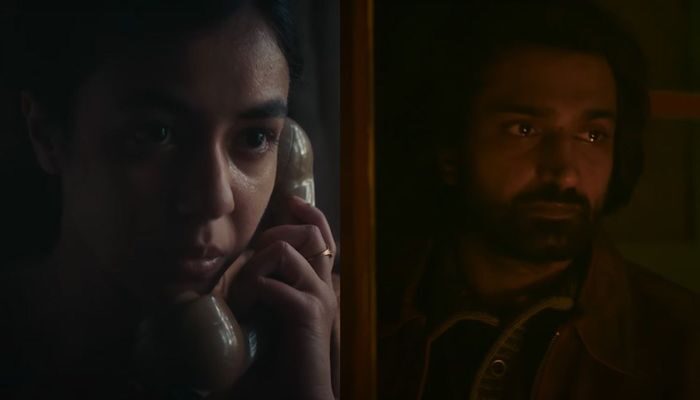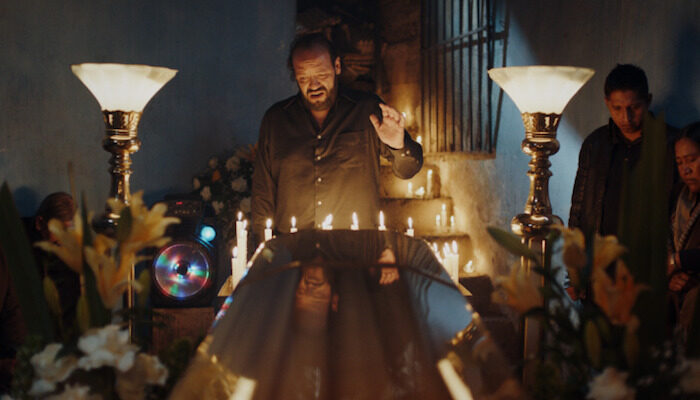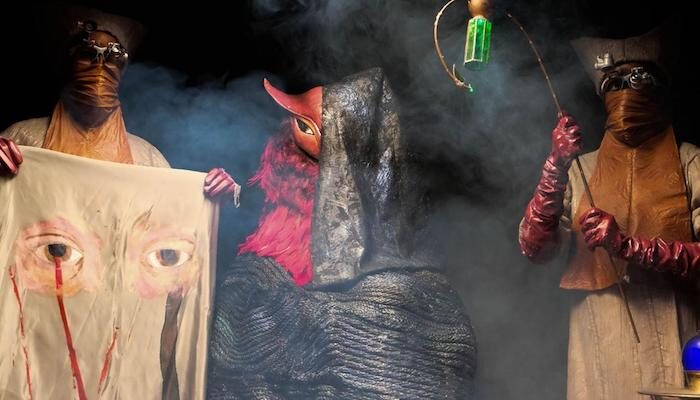Film Review: WE MIGHT AS WELL BE DEAD: Comment on Tribalism Shows More Than It Tells [Tribeca 2022]
We Might As Well Be Dead Review
We Might As Well Be Dead (2022) Film Review from the 21st Annual Tribeca Film Festival, a movie directed by Natalia Sinelnikova, written by Viktor Gallandi and Natalia Sinelnikova, and starring Ioana Iacob, Pola Geiger, Jörg Schüttauf, Siir Iloglu, Susanne Wuest, Knut Berger, Moritz Jahn, Mina Sadic, Felix Jordan, Ludwig Brix, and Lara-Sophie Malagro.
This German-Polish production shows more than it tells with only a few hints to reconcile the visual and logical narratives.
The director, Natalia Sinelnikova, certainly knows how to frame a scene. She also knows how to set a mood. We Might As Well Be Dead opens following behind a well-dressed family tramping through the beautiful autumn woods like fleeing refugees, and we feel the tension right away. The clever underpinning of cognitive dissonance heightens as the trio hustles over the vast, well-tended lawns to the wrought-iron gates that open into a wide driveway. Then it hits you–why isn’t this apparently prosperous family driving?
This is possibly a cautionary tale about a highly selective gated community that may set a new standard for co-op criteria, beyond the perfunctory are-you-a-desirable-neighbor. Applicants are desperate to escape out there, as one family puts it, even to the point of abject begging or bribery. One can only wonder how bad it really is “out there,” considering the degree of paranoia inside the fences, emphasizing another notion suggested in this film: craziness is in the eye of the beholder.
Of course, there is the viewpoint that reality is only what we tell each other it is. The filmmakers explored this dissonance more thoroughly, maybe, than any other theme. The bucolic scenes are vast, almost panoramic, even more surreal because they’re so underpopulated. Phoebus, one of the buildings in the complex, rises above the tranquil grounds — an expansive, squat skyscraper that could easily house hundreds. But we see no more than the same dozen or so residents interacting at any given time. No one plays golf on the rolling greens; no one disturbs the glassy surface of the lake-sized indoor pool, or even lounges nearby.
At the center of the action is Anna, and her neurotic daughter, Iris. Anna gets living space gratis as the sole security guard cum concierge. She screens hopeful applicants and investigates possible transgressions, one of which is the continuing case of a missing dog and its generally unhinged owner. Iris claims to have killed the poor creature with her ‘evil eye’ and consequently barricaded herself in the bathroom to spare future victims, now and again announcing prophesies of disaster for the other dwellers.
The last third of the film really ramps up the action. The residents’ eccentricities, suspicions, and ambivalence converge into outright paranoia. Anna’s best efforts can’t seem to put anything into perspective until a ranking co-op committee member drops a tidbit that seeps xenophobia and bigotry. Evidently Anna was hired in spite of pushback from other members, so she’s told, of being Jewish, and a Polish Jew at that.
Soon afterward, Wolfram, the scruffy handyman who trades his nominal skill for a mattress in the basement, finds himself demoted from virtual serf to scapegoat. He unwittingly shoulders blame for a plethora of infractions, from the missing dog to an elusive killer out of Iris’ visions, supposedly stalking the residents. With 9-irons held aloft, the tenants force Wolfram into summary exile with only the ragged clothing on his back, along with the box of penny chapbooks of his poetry.
In the long run, I believe the prevailing theme in this film, if not the central one, is the insanity of tribalism. We Might As Well Be Dead conveys this very well through the characters’ eccentricities, and the actors uniformly distinguish themselves in this regard. Some broader context might have been helpful, though I am inclined to give some latitude here. “Out there” might reflect either real anarchy or just reactionary attitudes of like-minded peoples in any gated, insular community like Phoebus. But in the long run, that issue is moot if paranoia and blind antagonism are the result either way, which is something to think about.
Otherwise, I didn’t find the film nearly as suspenseful as I had expected. Like the gated community itself, the stakes for the characters involve a closed loop, and the options for resolution are pretty narrow. Despite its cleverness, the payoff is something of a letdown. The ending is particularly disappointing because, as stated, there is no clear notion of why out there is so daunting for those cast out, while it’s hard to imagine out there as that much worse.
Rating: 7/10
Leave your thoughts on this We Might As Well Be Dead review and the film below in the comments section. Readers seeking to support this type of content can visit our Patreon Page and become one of FilmBook’s patrons. Readers seeking more Tribeca Film Festival news can visit our Tribeca Film Festival Page, our Film Festival Page, and our Film Festival Facebook Page. Readers seeking more film reviews can visit our Movie Review Page, our Movie Review Twitter Page, and our Movie Review Facebook Page. Want up-to-the-minute notifications? FilmBook staff members publish articles by Email, Twitter, Facebook, Instagram, Tumblr, Pinterest, Reddit, and Flipboard.
Related Articles
FilmBook's Newsletter
Subscribe to FilmBook’s Daily Newsletter for the latest news!













